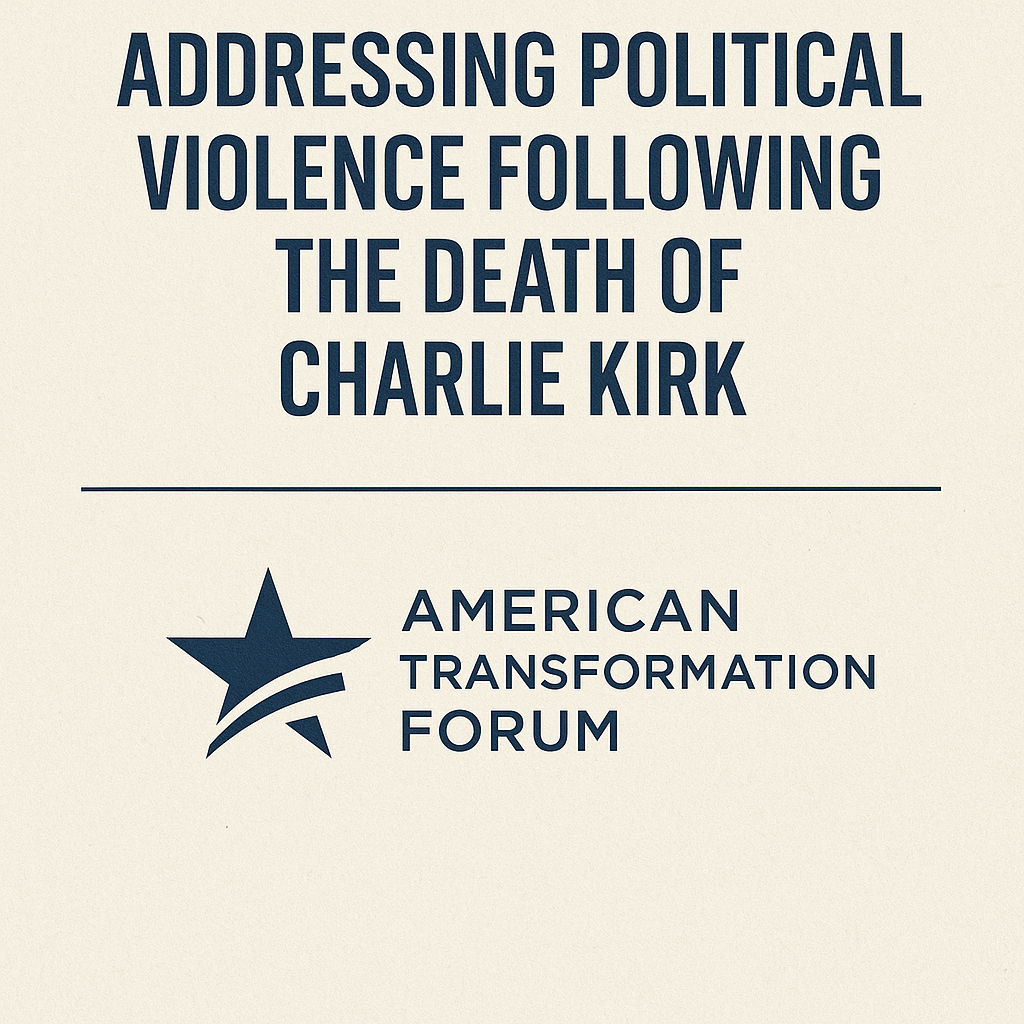Policy Memo: Addressing Political Violence Following the Death of Charlie Kirk
1. Immediate Fact Summary
-
On September 10, 2025, conservative activist Charlie Kirk was fatally shot while speaking at a public event on the campus of Utah Valley University (UVU) in Orem, Utah
-
The shooting occurred during the opening session of his “American Comeback Tour.” The bullet struck him in the neck at approximately 12:10 p.m. local time, allegedly fired from a campus building about 200 yards away
-
A man briefly taken into custody was later released, as he was not the shooter; the actual assailant is still at large
-
Kirk was pronounced dead later that day; news of his death was confirmed publicly by former President Donald Trump
-
The incident spurred swift, bipartisan condemnation: political leaders from both parties—including Senate Majority Leader John Thune and House Minority Leader Hakeem Jeffries—issued statements rejecting political violence as unacceptable
-
The FBI and ATF have both mobilized to support the investigation
-
A moment of silence was held in the U.S. House, and national political figures called for unity and prayers
2. Significance for American Political Life
-
Kirk’s death is not an isolated incident. It acts as part of a troubling escalation of politically motivated violence—including prior assassination attempts and targeted attacks—that increasingly endangers public political discourse
-
His high-profile role as founder of Turning Point USA, a youth-focused conservative movement, amplifies the political implications, particularly for extremist polarization among young voters
-
The shooting unveils potential security vulnerabilities at civic events, especially regarding accessible locations on college campuses, and the presence of armed threats that jeopardize public safety.
-
Bipartisan condemnation underscores a rare moment of cross-partisan unity—suggesting there is political capital in collective action against political violence.
3. Policy Recommendations for American Transformation Forum
A. Strengthening Security Protocols
-
Deploy comprehensive threat assessments and surveillance (e.g., rooftop checks) at politically charged campus events.
-
Coordinate with local law enforcement, FBI, ATF, and campus security to enhance rapid response capabilities and protective perimeters.
-
Develop best practice guidelines for campus event planning, including evacuation protocols, crowd management, and communication strategies.
B. Legislative and Regulatory Measures
-
Advocate for federal grants to fund threat assessment infrastructure and security training at colleges.
-
Recommend mandating reporting requirements for threats and incidents at public political events to create a national database.
-
Support hate- and politically motivated violence prevention grants, including public awareness campaigns.
C. Bipartisan Cooperation Framework
-
Facilitate a cross-party caucus or working group dedicated to combating political violence.
-
Draft a united declaration signed across party lines to affirm that political violence erodes democratic norms.
D. Civic Education & Public Awareness
-
Launch an initiative promoting norms of nonviolence, featuring civil discourse workshops and youth programming.
-
Collaborate with educational institutions to foster environments that prioritize political safety and dialogue.
E. Crisis Response and Victim Support
-
Establish a national rapid response coalition to assist communities after political violence—including trauma counseling and logistical support.
-
Formulate a legal advisory network for victims’ families, responding promptly to incidents.
4. Strategic Role for American Transformation Forum
-
Public Leadership: Issue a well-publicized statement declaring the Forum’s commitment to ending political violence, calling on stakeholders to act.
-
Policy Development and Advocacy: Draft and propose model legislation; align with Congressional and state policymakers to push preventive laws.
-
Event Security Guidance: Develop a public “Security Blueprint for Political Gatherings,” especially tailored to university and campus contexts.
-
Coalition Building: Organize a “Summit on Political Resilience,” bringing together policymakers, campus leaders, law enforcement, and civic organizations.
-
Media & Narrative Shaping: Publish op-eds, host forums, and leverage social media to promote a zero-tolerance stance on political violence and reinforce democratic ideals.
5. Conclusion
The death of Charlie Kirk on September 10, 2025, underscores the escalating severity of political violence in the U.S. It is a clarion call—not just for enhanced security, but for a cohesive cultural and political response that transcends ideology.
The American Transformation Forum is uniquely positioned to lead this response—leveraging its influence to craft policy, convene stakeholders, and champion a vision of a politics robust in debate, but immune to violence.
Check out the GTF Research
Check out events
Connect with us on facebook
connect with us on linkedIn
Check out the American Transformation forum
